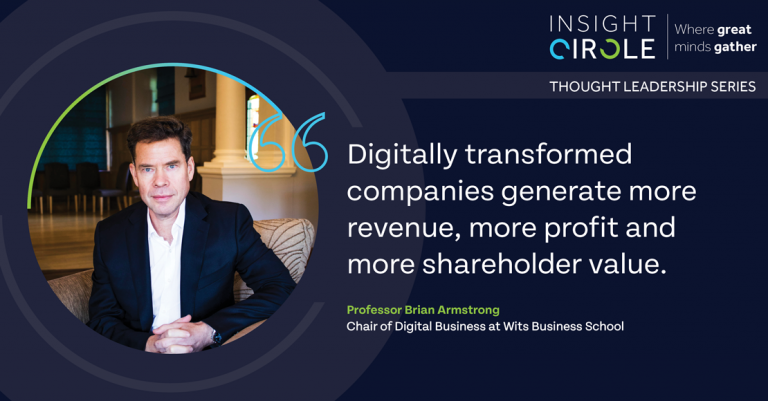
In this second instalment, Prof Armstrong, chair of Digital Business at Wits Business School expands on his thoughts about digital transformation, tackling the thorny issues of digital ethics as well as how companies should be taking responsibility for how they manage their digital growth.
Africa has a bright future in the broader digital economy
As an avid advocate of the benefits of digital transformation, Prof Armstrong says South African companies need to take swift action if they want to stay competitive. He also says there is an abundance of evidence that digitally transformed firms outperform the digital laggards.
“On a like-for-like basis, digitally transformed companies generate more revenue, more profit and more shareholder value. Data published by the IMF shows that digitally transformed industries can command double the mark-ups of industries that aren’t. There is clearly a positive impact on the performance of our firms who have embraced a digital future,” he explains, encouraging local companies to invest in their future rather than taking a purely cost-cutting stance.
Looking further afield, Prof Armstrong says that he doesn’t necessarily believe Africa needs to take a lead in first-line manufacturing when it comes to tech and AI. However, he says that Africa has a real flair for finding innovative uses for technological developments and if we apply these to create new frontier technologies, we could then export these advances to the rest of the globe.
Addressing the high level of unemployment, Prof Armstrong says Africa can also make use of emerging tech to create additional labour consuming platforms such as Uber - although he points out that these must come with fair employment contracts.
A third opportunity for Africa lies in the rapidly expanding world of AI.
“There is an insatiable demand for tagged data sets. This area could be the next outsourcing opportunity for Africa,” he shares.
With great opportunity comes great responsibility
As ESG (Environmental, Social, Governance) issues continue to capture the attention of boardrooms, Prof Amstrong says South African companies still have work to do when it comes to digital ethics.
“South African firms still have a way to go when it comes to putting technology at the heart of the responsibility agenda. There is a potential for exclusion and alienation. The reality in South Africa is that we still have a digital divide. This is primarily defined by spatial, income and education dynamics, and obviously with an historical racial aspect attached to this. What’s more, people of an advanced age are increasingly being excluded from the digital economy. These digital divides can be viewed as the dark side of digitalisation,” he explains.
Prof Armstrong notes, however, that there is a considerable amount of literature around how companies can be digitally ethical, including frameworks on which to hang a firm's digital agenda. He also says that a key focus in his teaching is looking at how to bring digital ethics into the broader ESG conversation.
“The digital divide can be broken into three levels. The first is access. People need to have affordable, available access to the internet. The second is that once they have access, they need to have the right ability and skill to use the access. The third is that these need to translate into beneficial impact in an economic or social sense. I think South Africa has made good progress on the access, but we have a long way to go at the usage and beneficial impact levels. But there are frameworks that can guide us. We can also address the jobs and alienation issues, we can empower our people with skills - and, in turn, this will go a long way to addressing the usage issues as well,” he explains.
The importance of our humanness will increase over time
In a linguistic paradox, Prof Armstrong says successful digital transformation is not about tech. Rather, he says it is about leadership, culture and organisational change.
“Too many people think that if they get the latest, greatest tech and do a few cool things with it, they are digital winners. I believe that the latest Presidential Commission on the 4th Industrial Revolution was too focused on technology, and insufficiently focused on leadership responses as well as strategic, commercial, political and policy responses. This is where the focus needs to be, not the cool new science,” he says in what he acknowledges as a contrarian view.
In a further paradoxical statement, Prof Armstrong admits that what will differentiate companies in a digital world will be their humanness.
“Firms that are able to offer a genuinely human, empathetic moment of truth with customers will differentiate themselves in the marketplace. It doesn’t mean that the business can’t be 99 percent digital, but the difference will come in how they are able to address people’s need for a human experience when dealing with brands,” he explains.
As a parting shot, Prof Armstrong points out that with an increase in digitalisation there comes an increase in market concentration and market power of the leaders in the tech industry. With this additional market concentration, he says we can expect more anti-trust action, such as that faced by Google and other Big Tech companies. What’s more he leaves us with a final caution that despite its many benefits, market structures may shift as a result of digitalisation.
There is no doubt that Prof Armstrong will continue to lead the conversation in digital transformation in Africa over the coming years. For those who aren’t lucky enough to attend his classes, you can delve a little deeper into this fascinating world through his book, Digital Business, 2021 (Armstrong, B.C. and Lee, G. J. by Silk Road Press, ISBN 9780620922500) available at Amazon or via direct order from Wits University.
Step into the future of business messaging.
SMS and two-way channels, automation, call center integration, payments - do it all with Clickatell's Chat Commerce platform.








